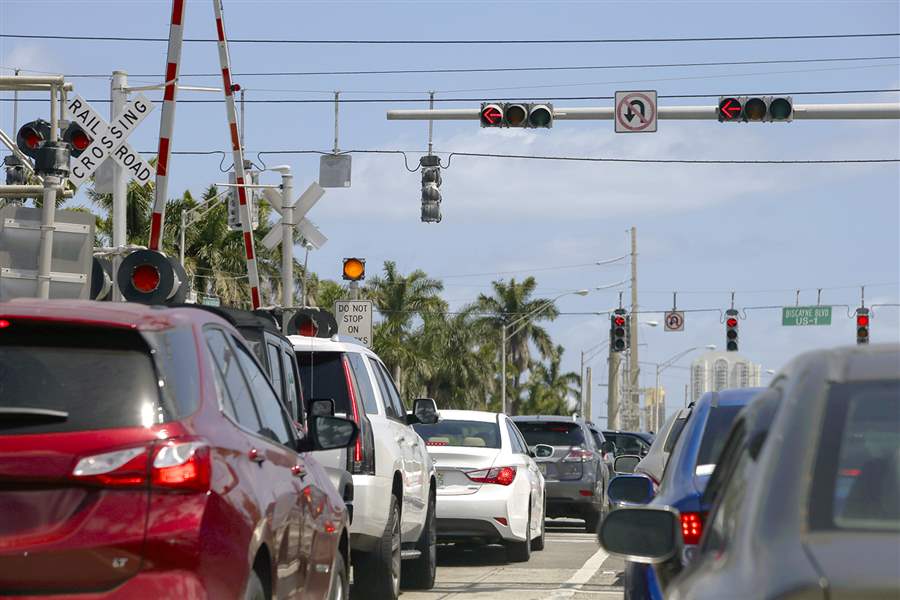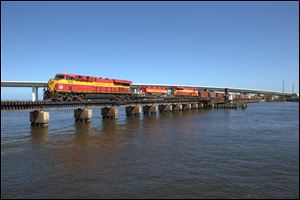
Brightline skeptics worry about safety, environment in Florida
4/13/2018
Motorists in backed-up traffic disregard a Do Not Stop on Tracks sign in Aventura, Fla. along the Florida East Coast Railway tracks that Brightline trains to and from Miami will begin using later this year.
THE BLADE/DAVID PATCH
Buy This Image

Motorists in backed-up traffic disregard a Do Not Stop on Tracks sign in Aventura, Fla. along the Florida East Coast Railway tracks that Brightline trains to and from Miami will begin using later this year.
STUART, Fla. — While passengers and promoters gush about the speed and comfort of the new Brightline trains rushing between West Palm Beach and Fort Lauderdale, Fla. — and soon all the way to Miami — David Cook isn’t so impressed.
Mr. Cook, the proprietor of Hand’s Hallmark in Delray Beach, Fla., has set up a mocking display of the “High Speed Killer Bullet Train Set” in his shop’s front window.
The trains so far have run mostly empty, Mr. Cook said, and all they do for communities between West Palm and Fort Lauderdale is delay street traffic, make noise, and occasionally hit people on the tracks.
“It doesn’t stop here. It’s not useful to people in Delray Beach, or Boca [Raton], or Boynton [Beach],” he said.
RELATED: Brightline looks to revive intercity rail travel
Safety and quality-of-life issues — six fatalities to date are attributed to the new train — have been raised by critics. Those concerns along with allegations about environmental harm caused when either vehicles or boats have to wait for trains at crossings and drawbridges, form the backbone of a federal lawsuit seeking to block Brightline’s second phase between West Palm Beach and Orlando.
Two counties, a public opposition group, and an emergency-services district filed the the 94-page lawsuit in February. It contends that federal proceedings to approve $1.15 billion in tax-exempt Private Activity Bonds, which form a significant part of Orlando-phase financing, were defective in several ways.
The project’s approval under a section of the federal bond program that applies to highways or freight transfer facilities was improper, the lawsuit argues, noting also that the same program allows high-speed rail projects to be funded only if trains are capable of top speeds exceeding 150 mph.
No American passenger train currently exceeds 150 mph, and Brightline’s top proposed speed is 125.

A Florida East Coast freight train passes over the St. Lucie River drawbridge near Stuart, Florida on March 29, 2018. U.S. Rep. Brian Mast (R., Palm City, FL) has asked the Coast Guard to study how operating frequent Brightline passenger trains might compound delays boaters already incur because of long freight trains crossing this bridge and one nearby over the Loxahatchee River near Jupiter, Florida. Bridge delays are among numerous issues raised in a lawsuit seeking to block Brightline's expansion north of West Palm Beach.
But most of the suit accuses the U.S. Department of Transportation and the Federal Railroad Administration of glossing over or ignoring the harm people in Martin and Indian River counties will endure while up to 32 daily Brightline trains race through those counties without even offering local station stops.
Citing data from the project’s environmental-impact statements, the complaint predicts, among other concerns, growing traffic congestion and safety problems; increased pollution and environmental damage; and an increased risk of catastrophic freight-train collisions and derailments arising from conflicts between slow-moving freights and passenger trains traveling up to 110 mph.
The lawsuit also accuses regulators of dismissing out-of-hand an alternative routing for the passenger trains that would bypass coastal communities between Fort Pierce and West Palm Beach.
The alternative routing would send the new trains southwest along what is now a branch track across part of the Everglades to a connection near Okeechobee, Fla., with a CSX Transportation line between West Palm Beach and Orlando that Amtrak trains currently use.
According to the lawsuit, Brightline dismissed that option because of the need to use CSX rails. The planned Brightline route entirely uses track belonging to Florida East Coast Railway, except for new right of way between Cocoa, Fla., and Orlando that Brightline would build and own.
All Aboard Florida, the company developing Brightline, and FEC Railway previously both belonged to Florida East Coast Industries. Last year the parent company sold FEC Railway to Grupo Mexico, a large Mexican industrial conglomerate, while retaining rights for the new passenger trains to use Florida East Coast rails.
Patrick Goddard, Brightline’s chief operating officer, dismissed the lawsuit and previous suits in which Brightline prevailed as “a shameful waste of public resources” that he attributed to “a little bit of a culture that’s anti-progress in some of these communities.”
Incidents of trains striking pedestrians and vehicles since testing began last year, he said, are “all cases of purposeful circumvention of safety systems,” he said, adding that at least a few of the six fatalities to date have been ruled as suicides.
South Florida, with flat terrain and dense population, long has had problems with grade-crossing collisions and trespasser deaths along its railroad lines. Last year alone, 22 people were killed along a state-owned rail line between Miami and West Palm Beach, roughly parallel to the FEC but farther inland.
U.S. Rep. Brian Mast (R., Palm City, Fla.) has requested Congressional hearings on both the safety issue and the question of whether Brightline even properly qualifies for the Private Activity Bond program. At Mr. Mast’s request, the Coast Guard is studying the trains’ potential impact on boat traffic through several drawbridges along the line.
“Brightline needs to take responsibility for the fact that their trains are killing people,” Mr. Mast said in a Jan. 18 statement. “These deaths clearly indicate there are safety issues, and Brightline has a long history of straight-up lying to the people of Florida, so at this point they cannot be trusted to decide if their trains are safe.”
A U.S. House of Representatives Oversight Subcommittee on Government Operations hearing on the financing issue has been scheduled for Thursday morning.
“Despite their claims to the contrary, Brightline has pursued public, taxpayer-funded financing,” Mr. Mast said while announcing the hearing Friday. “Taxpayers deserve the truth about who is paying for Brightline, and our community deserves answers about why they are refusing to address critical safety and economic concerns.”
Earlier last week, Brightline and several public agencies announced an educational campaign to promote safety near the tracks between Fort Lauderdale and Miami where Brightline trains are now testing and are expected to enter revenue service soon.
Brightline has mounted other public-awareness campaigns to encourage the public to behave safely near the tracks it uses and is working with communities along the line on safety enhancements, Mr. Goddard said previously.
As for the mostly empty trains Mr. Cook cited, Mr. Goddard predicted ridership will grow when the Miami station opens, but in the meantime business during the startup phase between Fort Lauderdale and West Palm Beach has exceeded Brightline’s expectations threefold. He declined, however, to release statistics.
“Right now we’re only serving 20 percent of the market,” Mr. Goddard said. “We’re highly encouraged by the initial numbers over the first 60 days.”
Contact David Patch at dpatch@theblade.com or 419-724-6094.